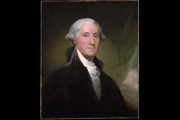
After returning to Syria, Aflaq began a serious association with the Syrian Communist Party, controlled at that point by Moscow. Aflaq and his friend Salah al-Din al-Bitar soon lost faith in the Communists, not from any particular event in Syria, but because the French Communist Party joined the Popular Front (and so became part of the French government, which held Syria as a French League of Nations mandate). Syrian Communists — indeed all Communists throughout the world, including the French Communist Party — followed Stalin’s orders. When French Communists rebelled — such as Jacques Doriot, the French Communist Party Floor Leader in the Chamber of Deputies — they were purged. Aflaq found Nazism a system compatible to his own beliefs, which — like those of Stalin and Hitler — may be defined as "national socialism."
Aflaq and al-Bitar began to focus more on Arab nationalism (without, however, losing their socialist origins), and in 1946 the two men founded the Ba’ath Party. After a predictable series of power grabs and strong men, the Ba’ath Party was able to gain control in Syria. Though Aflaq himself served in different formal positions — Minister of Foreign Affairs and Minister for Guidance of the United Arab Republic — he remained the “intellectual” force behind this incarnation of socialism and nationalism.
The Ba’ath Party was overtly socialist. Its constitution declares that the party is Socialist (Article 26), that there must be redistribution of wealth (Article 27), that the workers should manage the factories (Article 32), that the state shall supervise trade to prevent exploitation (Article 36), and that Special Work Courts run by the workers and peasants would handle disputes with management (Article 40). Beyond that, when it came to power in Syria, it was with the close collaboration of the Communist Party — despite Aflaq’s separation from Communism per se. In 1957 the army chief of staff was dismissed and replaced by General Afif al-Birzi, a prominent Communist.
The Ba’ath Party also worked closely with the Communist Party in Jordan. And, of course, it also became the party in which Saddam Hussein ruled in Iraq. The Ba’ath philosophy and party were mere coverings, devoid of serious moral thinking — used by brutes such as Assad in Syria and Hussein in Iraq. Although Aflaq became the nominal Secretary-General of the Ba’ath Party in Iraq, he exercised little real power. He began to write increasingly about the need for Islam to defend Arab nationalism and vice versa (though he himself remained a nominal Christian). When Aflaq died, he was given an elaborate Muslim funeral, based upon government statements that he had converted to Islam.
Michael Aflaq was the “Karl Marx” of Islamic Socialism, and his life showed just how little power Marx himself would have had if he had survived the Bolshevik junta of 1917. Power — naked, raw, and savage power — is the only purpose behind the collectivist ideologies of men such as Marx and Aflaq. No one, including Ba’ath Party bosses, was really listening to Aflaq when he died in 1989. They were listening only to the siren song of power.



